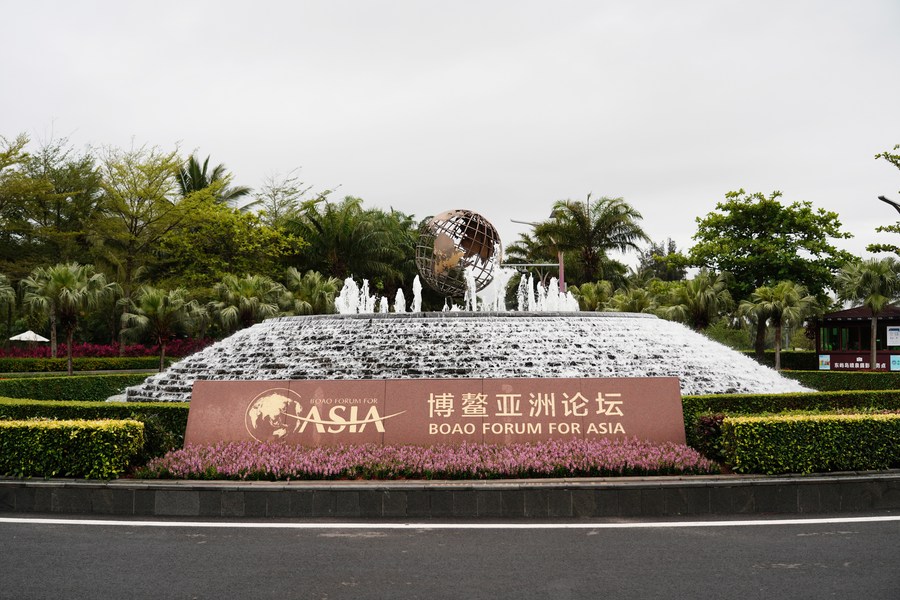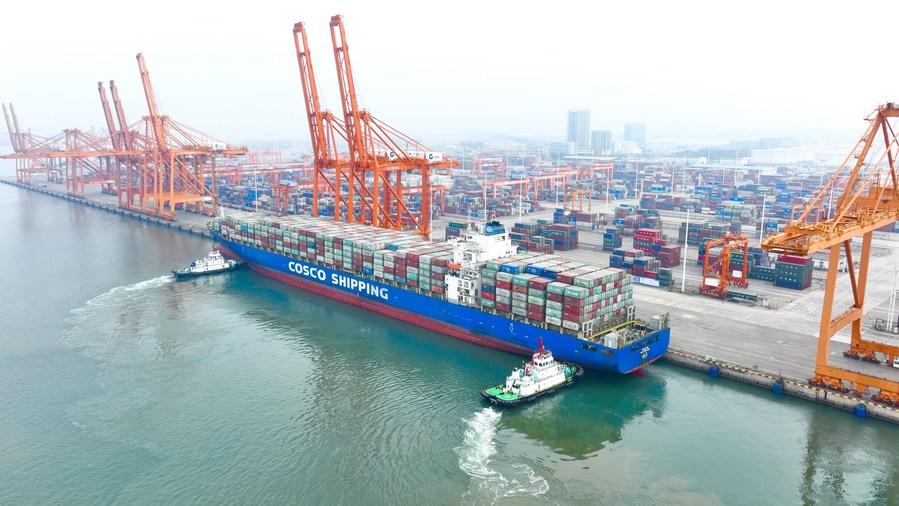World Insights: With solidarity, cooperation in limelight, Boao Forum for Asia expected to convey confidence to world

This photo taken on March 27, 2023 shows a fountain square in front of the Boao Forum for Asia (BFA) International Conference Center in Boao, south China's Hainan Province.(Xinhua/Fan Yuqing)
International participants of the event and observers overseas believe that the importance of Asia in the world economy continues to grow, and the dynamic cooperation among and development of Asian countries, especially China, has delivered precious confidence and stability to the world.
BOAO, Hainan, March 29 (Xinhua) -- As some 2,000 delegates from over 50 countries and regions are attending the Boao Forum for Asia (BFA)'s annual conference from Tuesday to Friday, calls for solidarity and cooperation are gathering greater steam for a post-pandemic world fraught with uncertainties.
"We hope to explore certainty in an uncertain world and promote solidarity and cooperation among countries to better meet challenges through discussions at the annual conference. We also aim to uphold openness and inclusiveness to better promote development," BFA Secretary General Li Baodong told a press conference on Tuesday.
International participants of the event and observers overseas believe that the importance of Asia in the world economy continues to grow, and the dynamic cooperation among and development of Asian countries, especially China, has delivered precious confidence and stability to the world.
"Asia is going to become the new center of gravity in terms of global consumption. Therefore, we are seeing a change in global supply chains as more consumption is coming towards Asia, for example, South Asia and China," Ahsan Iqbal Chaudhary, minister for planning, development and special initiatives of Pakistan told Xinhua on the sidelines of the BFA.
The world production value chains will also realign themselves to meet this new demand, he said, adding that China's fast growth is good news for the world economy, as it will provide opportunities for every country alike.
Over the past decades, China has been committed to promoting cooperation and economic integration in Asia, Xu Xiujun, senior research fellow with the National Institute for Global Strategy and Institute of World Economics and Politics at the Chinese Academy of Social Sciences, told Xinhua.
He said that the BFA is playing an increasingly important role on the international stage, which shows that China is playing a more crucial role in global development and cooperation, and that the world has an increasingly strong demand for cooperation with China.
"We can use this platform to strengthen dialogue and exchanges among Asian countries and between Asian and other countries in the world, and then translate consensus reached into the promotion of development and cooperation in Asia," he added.
With an emphasis on multilateralism and equitable economic cooperation, China is well placed to be a guiding light for many developing countries, said Oh Ei Sun, a principal advisor for Malaysia's Pacific Research Center, adding that through the Belt and Road Initiative (BRI), China has been building a strong foundation for regional development.
In this aspect, he pointed out that the cooperation between China and Southeast Asia could be "a very shining example" for the rest of the world. "With China's guidance and tremendous investments over the last decade, I think a large part of the world has been well connected."
China has shared its success story of development with the rest of the world, Renat Bekturov, governor of Astana International Financial Centre, told Xinhua, noting that over the past few decades, China has managed to improve the well-being of its people and achieve leapfrog growth.
"Because of the BRI, we are generating so many projects and new ideas, and investments (are) being driven. We need that to grow the economy and elevate the living standards of our people," he said. "That (China's development) is a success story, it is sharing with the world."
China remains consistent in carrying out a foreign policy that provides great benefits to support the development of developing countries and less developed countries, said Veronika Saraswati, a researcher at Indonesia's think tank the Center for Strategic and International Studies.
"ASEAN (Association of Southeast Asian Nations) and China not only have geographical proximity, but also are mutually beneficial economic partners. As one of the efforts to maintain multilateralism, China and ASEAN have established a good momentum of multilateral economic and trade cooperation through active promotion and high-quality implementation of RCEP (Regional Comprehensive Economic Partnership)," the expert said.
Since January 2022, RCEP has come into force for more than a year, marking the world's largest free trade deal comprising 10 ASEAN countries, as well as China, Japan, the Republic of Korea, Australia and New Zealand, which represents 30 percent of the global GDP.

Aerial photo taken on March 2, 2022 shows a view of the container terminal of Qinzhou Port in south China's Guangxi Zhuang Autonomous Region. (Xinhua)
Data from the Ministry of Commerce showed that China's trade with the other RCEP signatories expanded 7.9 percent year-on-year to 11.8 trillion yuan (about 1.69 trillion U.S. dollars) in the first 11 months of 2022, accounting for 30.7 percent of China's total foreign trade value.
The rapid growth of trade activities under the RCEP framework is one of the key reasons for the strong growth dynamism of Southeast Asian economies, said Gu Qingyang, an associate professor at the Lee Kuan Yew School of Public Policy of the National University of Singapore.
"Tariff reduction has significantly reduced the cost of trade among member states, made trade more active and strongly promoted economic growth," he stressed, adding that the growth of direct investment among RCEP members reflects the rising momentum of industrial integration within the region.
It is also a strong appeal for extraterritorial economies, and is increasingly attracting foreign investment, Gu noted.
Sebastian Schulz, a researcher at the National University of La Plata in Argentina, said the Asia-Pacific is the engine and lifeline of the global economy. China is advocating a more inclusive globalization that respects the different development modes of each country, and is committed to promoting common global development, he added.


